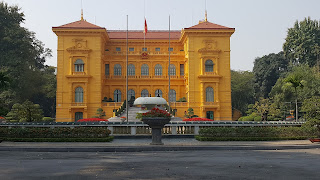Who is Ho Chi Minh?
Who was Ho Chi Minh?
Yesterday I headed off to Ho Chi
Minh’s Mausoleum, which is an impressive building with a parade ground in front
of it. This mausoleum is a national
treasure and is treated like sacred ground.
Visitors are firmly advised to walk through quickly and quietly. When I arrived at 7:45 a.m., I stood in a
line outside the building which was at least two city blocks long. I am told that this is the one place that
Vietnamese citizens visiting Hanoi MUST see.
Ho Chi Minh or “Uncle Ho” as he is lovingly called, is considered to be
the Father of Vietnam. His name- which
he chose for himself after many other names- means “Bringer of Light”.
It was interesting to me that he
never wanted to have this mausoleum built- just as he never wanted to live in
the beautiful presidential palace located just next to the mausoleum
grounds. Instead, he wanted to be cremated
and his ashes scattered in all across the country. He did not, as I understand, live in the
presidential palace, but instead in the house on stilts next to his own fishing
pond.
This leader, born in the center of
the country in 1890, first traveled to Paris in 1911. Later, he travelled to
the US on a French steamer. The Ho Chi
Minh museum states that he lived in Harlem, New York, in 1912-1913. Here he sympathized with the plight of the
African Americans. In 1919, He reached
out at the Versailles Peace Conference to President Woodrow Wilson in attempt to
gain support for Vietnamese independence.
Throughout his life his focus remained on a unified and independent
Vietnam. In his words, “Nothing is as
dear to the heart of the Vietnamese as independence and liberation.” It is certainly hard to find blame for that
sentiment.
However, we also need to remember point of view. Throughout the museum, I was struck by the wording that the north was fighting for the “liberation” of the south. Hmmm…I am not sure that this would have been the wording of the South Vietnamese at the time. Also interesting was a book in the museum’s gift gallery called Children at War. In this book, all children are smiling- digging trenches and smiling, studying on the ground rather than in a desk or a chair and smiling, working the fields and smiling. Life is better when you can control the media.
Unfortunately, Ho Chi Minh died at
the age of 79 in 1969. He did not ever
see the fall of Saigon and the end of the war in 1975, nor did he hear of the
renaming of Saigon to Ho Chi Minh City. Judging
by his desire for simplicity, I am not sure he would have approved. What he would have enjoyed the most, however,
is a unified, peaceful, and welcoming Vietnam.
As I always tell my students-if you
don’t believe or think I am wrong (very likely), look it up. I have two sources that I found to be very
interesting.
Karnow, Stanley. “Ho Chi Minh.” Time. Monday, Apr. 13, 1998.
Kirkpatrick, Charles E. “Ho Chi Minh.” Vietnam Magazine
. 1990.
This site has an informative four minute
video about Ho Chi Minh:
A friend here in Vietnam introduced
us to a great bookstore called The Bookworm.
There on Saturday I found a copy of Ho Chi Minh’s diary when he was held by Chiang Kai-Shek in a Chinese prison.
He was imprisoned for 18 months in 1941.
Here is a poem from that time.
Listening to the
Sound of Rice Pounding
By Ho Chi Minh
Under the pestle how terribly the rice suffers!
But it comes out of the pounding as white as cotton.
The same thing to man in this world occurs:
Hard trials turn him into a polished diamond.






It really is quite interesting how much perspective can change your views of a person. It sounds like Ho Chi Minh is considered a national hero of sorts, while here in the U.S. he is anything but.
ReplyDeleteDaniel
Two things: What do the Vietnamese think about the Vietnam or "American War"? I thought it was really cool how Ho Chi Min never lived in the presidential palace.
ReplyDeleteHimesh Kafle
It is surprising that in the book Children at War the children are all smiling. I think it is weird that Ho Chi Minh didn't want to live in the presidential palace. -Matt
ReplyDeleteWhat is the Mausoleum? What was his mission to do while in the United States?
ReplyDeleteThank You!
Ayden Asche
Were his ashes ever scattered across the country? What did he want to do when he was in the United States?
ReplyDelete-Lauren H.
Why did he travel to Paris?
ReplyDelete